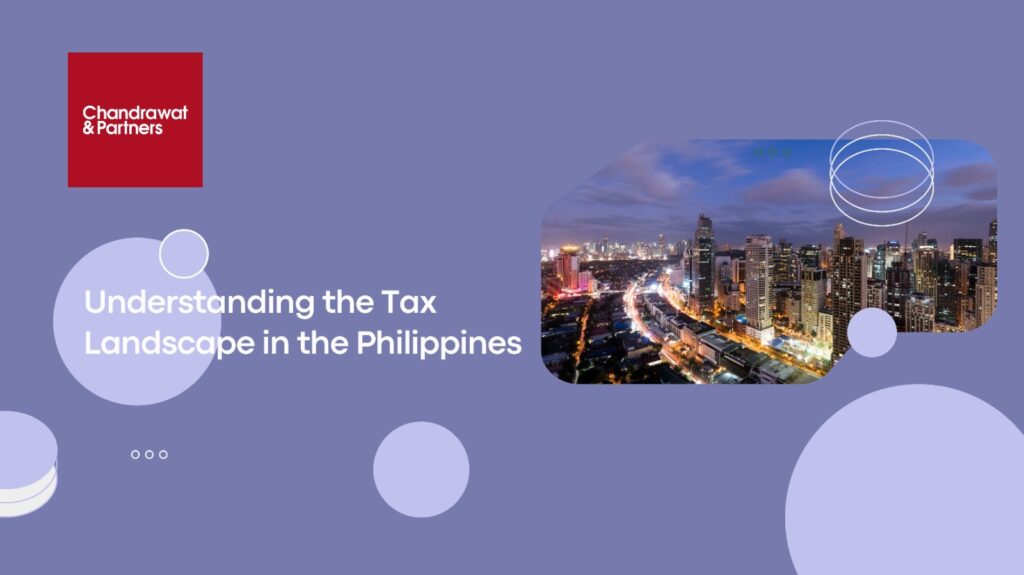
July 5, 2024
UNDERSTANDING THE TAX LANDSCAPE IN THE PHILIPPINES
OVERVIEW OF TAX OBLIGATIONS
The Philippines imposes corporate and personal income taxes on its resident citizens and domestic corporations, including subsidiaries of foreign corporations, based on worldwide income. In contrast, foreign corporations, non-resident Philippine citizens, and foreign nationals are taxed only on income sourced within the Philippines.
TAX RATES AND REGULATIONS
NON-RESIDENT FOREIGN CORPORATIONS
The National Internal Revenue Code (NIRC) generally imposes a 25% income tax on the gross income of non-resident foreign corporations from Philippine sources. Dividends paid by domestic corporations to non-resident foreign corporations are also taxed at 25%, but this rate can be reduced to 15% if the foreign corporation’s country of domicile provides a tax credit equivalent to the difference between the regular 25% rate and the 15% preferential rate. Interest on foreign loans to non-resident foreign corporations is subject to a 20% income tax.
DOUBLE-TAX TREATIES
The Philippines has established several double-tax treaties to mitigate or eliminate double taxation. For instance, the Philippines-United States Tax Convention (1983) caps the withholding tax on most cross-border interest payments at 15%.
VALUE ADDED TAX (“VAT”)
The national government imposes a VAT at a general rate of 12% on the gross sales of goods and services, as well as imports. Certain transactions may qualify for a zero-percent VAT rate or be exempt from VAT altogether. Notably, services sold to non-residents are typically subject to the 12% VAT.
WITHHOLDING AND REMITTANCE OBLIGATIONS
Philippine payers are responsible for withholding and remitting income tax and VAT on behalf of non-resident recipients, ensuring compliance with national tax regulations and facilitating the collection of taxes from foreign entities.
LOCAL TAXES AND FEES
Local governments in the Philippines, including provinces, cities, and municipalities, impose various local business taxes and fees. The Local Government Code (LGC) outlines the maximum allowable taxes, and each Local Government Unit (LGU) has the authority to create its own tax ordinances within these limits.
TAXATION AUTHORITIES
NATIONAL LEVEL
The Bureau of Internal Revenue (“BIR”) is the principal authority overseeing national taxes in the Philippines. The BIR is responsible for implementing, assessing, and collecting national internal revenue taxes such as income taxes, VAT, excise taxes, and others. The Commissioner of Internal Revenue (CIR) has the power to interpret tax laws, subject to review by the Secretary of Finance, and to adjudicate disputes and claims related to these taxes.
LOCAL LEVEL
At the local level, LGUs are empowered to impose and collect local taxes, including real property taxes, professional taxes, and business taxes. Each LGU operates its own revenue office to administer and collect these taxes, ensuring that local tax regulations are adhered to within their jurisdictions.
CONCLUSION: THRIVING IN THE PHILIPPINE BUSINESS ENVIRONMENT
Navigating the intricate tax system in the Philippines is crucial for both resident and foreign entities. By comprehensively understanding corporate and personal income tax obligations, utilizing double-tax treaties, and adhering to national and local tax regulations, businesses can ensure compliance and optimize their tax liabilities. This knowledge equips businesses to thrive in the dynamic and growing Philippine market.
HOW WE MAY HELP ?
Navigating the Philippine tax system can be complex, especially for non-resident foreign corporations. Our team is here to assist with a range of services tailored to business needs:
- Tax Compliance Assistance: We ensure that a business complies with the NIRC and other relevant tax regulations. Our experts can guide through the process of understanding and fulfilling income tax obligations, including the special conditions for reduced tax rates on dividends and interest on foreign loans.
- Double-Tax Treaty Utilization: Our specialists can assist in leveraging double-tax treaties to mitigate or eliminate double taxation, such as the Philippines-United States Tax Convention 1983.
- VAT Compliance and Optimization: We provide guidance on VAT obligations, ensuring that you accurately apply the general 12% VAT rate and identify transactions that may qualify for zero-percent VAT or exemptions. This includes services sold to non-residents and other qualifying transactions.
- Withholding and Remittance: Our team can help to manage withholding and remittance obligations, ensuring that income tax and VAT are correctly withheld and remitted on behalf of non-resident recipients. This ensures compliance with national regulations and smooth operation of business.
- Liaison with Tax Authorities: Our professionals can act as liaison with the BIR and Local Government Units (LGUs). Partnering with us ensures confident navigation of the Philippine tax landscape, ensuring compliance and optimizing tax liabilities to thrive in this dynamic business environment.
For more information or queries, please email us at
enquiries@chandrawatpartners.com
Key Contact

Surendra Singh Chandrawat
Managing Partner

